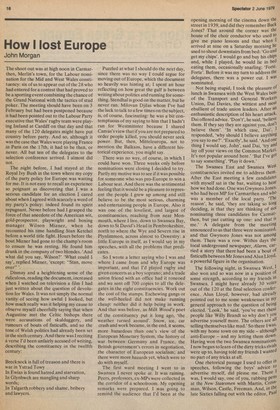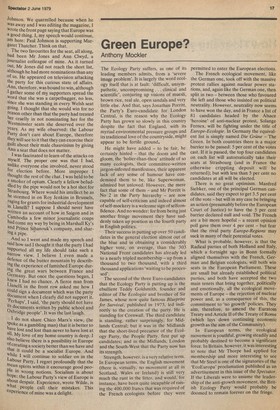How I lost Europe
John Morgan
The shoot out was at high noon in Carmarthen, Merlin's town, for the Labour nomination for the Mid and West Wales constituency: six of us to appear out of the 28 who had entered for a contest that had proved to be a sporting event combining the chance of the Grand National with the tactics of stud poker. The meeting should have been on 3 February but had been postponed because it had been pointed out to the Labour Party executive that Wales' rugby team were playing Ireland at Cardiff on that day and that many of the 120 delegates might have put country before party. And so, although it was the case that Wales were playing France in Paris on the 17th, it had to be then, or never. All but ten of the delegates to the selection conference arrived. I almost did not.
The night before, I had stayed at the Royal Ivy Bush in the town where my copy of the party policy for Europe was waiting for me. It is not easy to recall an experience so poignant as discovering that I was a serious candidate for an election I cared about when I agreed with scarcely a word of my party's policy: indeed found its spirit repugnant. Never before had I grasped the force of that anecdote of the American wit, gold-prospector, playwright and boxing manager Wilson Mizner, when he recounted his time handling Stan Ketchel before a world title fight. Hours before the bout Mizner had gone to the champ's room to ensure he was resting. He found him drunk in the company of two blondes. 'And what did you say, Wilson?' What could I say', replied Mizner, 'except: "Stan, move over" '.
Dismay and a heightening sense of the ridiculous, reading the document, increased when I watched on television a film I had just written about the question of devolution for Wales. It was not simply the normal vanity of seeing how awful I looked, but how much really was it helping my cause to observe myself cheerfully saying that when Augustine met the Celtic bishops there were accusations of skulduggery, and rumours of bouts of fisticuffs, and so the tone of Welsh politics had already been set in the sixth century. And there was! reciting a verse I'd been unfairly accused of writing, describing the constituency in the twelfth century: Brecknock is full of treason and there is war in Ystrad Towy In Ewias is found hatred and starvation, In Glynbwch are mangling and sharp words; In Talgarth robbery and shame, bribery and lawyers. Puzzled at what I should do the next day, since there was no way I could argue for moving out of Europe, which the document so heavily was hinting at, I spent an hour reflecting on how great the gulf is between writing about politics and running for something. Stendhal is good on the matter, but he never ran. Milovan Djilas whom I've had the luck to talk to a few times on the subject, is, of course, fascinating: he was a bit contemptuous of my saying to him that I hadn't run for Westminster because I shared Cam us's view that if you are not prepared to order people killed, you should never seek power. But, then, Mitteleuropa, not to mention the Balkans, have a different historical experience, you might say.
There was no way, of course, in which I could have won. Three weeks only before nominations were closing I decided to try. Partly my motive was to see if it was possible for someome who was pro-Europe to win a Labour seat. And there was the sentimental feeling that it would be a pleasure to represent the people I grew up among and still believe to be the most serious, charming and entertaining people in Europe. Also it was one of the loveliest, and largest of constituencies, reaching from near Monmouth, where I live, down to Swansea Bay, down to St David's Head in Pembrokeshire, north to where the Wye and Severn rise in Plynlimmon, across almost to Oswestry: a little Europe in itself, as I would say in my speeches, with all the problems that predicates.
So I wrote a letter saying who I was and where I came from and why Europe was important, and that I'd played rugby and given concerts as a boy soprano; and a trade union friend with an office had it roneoed and we sent off 700 copies to all the delegates in the eight constituencies. Work out the cost of the stamps. Eschewing gangs or the well-heeled did not make running cheap: neither did it help being in work. And that was before, as Milk Wood's poet of the constituency put it long ago, 'the weather turned around'. Snow, ice, car crash and work became, in the end, it seems, more hazardous than one's view of the European Monetary System, the history of war between Germany and France, the British government's errors in negotiation, the character of European socialism; and there were more hazards yet, which were to do with myself.
The first ward meeting I went to in Swansea I never spoke at. It was raining. Peers, professors, ex-MPs were collected in the corridor of a schoolroom. My opening remarks were prepared. I was going to remind the audience that I'd been at the opening morning of the cinema down the street in 1939, and did they remember Buck Jones? That around the corner was the house of the choir conductor who used to give me piano lessons and that when I arrived at nine on a Saturday morning he used to shout downstairs from bed: 'Go and get my chips'. I would go and buy his chips and, while I played, he would lie in bed eating them, occasionally snarling: 'Forte. Forte'. Before it was my turn to address the delegates, there was a power cut. I was nominated.
Not being stupid, I took the pleasure of lunch in Swansea with the West Wales boss of the Transport and General Workers Union, Dai Davies, the wittiest and most ebullient of trade union leaders. After an enthusiastic description of his heart attack, Dai offered advice. 'Don't', he said, 'believe them. If they say they are against you, don't believe them'. 'In which case, Dai', responded, 'why should I believe anything you say to me?'. 'Exactly', he said. 'And one thing I would say, John', said Dai, 'try and lay off your views on the Common Market, It's not popular around here.' Tut I've got to say something'. 'Play it down.'
The Swansea East and Swansea West constituencies invited me to address their. After the East meeting a few candidates with myself sat in the bar, waiting to hear how we had done. One was Gwynoro Jones, who had been MP for Carmarthen and who was a member of the local party. 'The reason', he said, 'they are taking so long deciding, is that they are thinking of not nominating three candidates for Carmarthen, but just cutting up one: and that is me.' A delegate from the meeting announced to us that three were nominated, and that Gwynoro Jones was not among them. There was a row. Within days the local underground newspaper, Alarm, carried a story that there had been a bout of fisticuffs between Mr Jones and Alun Lloyds a powerful figure in the organisation.
The following night, in Swansea West, I also won and so was now in a position of some strength, according to my friends to Swansea. I might have already 30 votes out of the 120 at the final selection conference. Alun Lloyd, however, had already pointed out to me some weaknesses in rnY general approach to the question of being elected. 'Look,' he said, 'you've met these people like Willy Brandt so why don't you advertise yourself more. The others are all selling themselves like mad.' So there I was, with my home town on my side — although anti-Europe — and my letting them down. Having won the two Swansea nominations, I now began to learn of the dirty tricks rivals were up to, having told my friends I wanted no part of any tricks at all. One rhetorical passage I used to offer in speeches, following the boys' advice t° advertise myself, did please me. There 1 was, I would say, one of you, rubbing Pens at the New Statesmen with Martin, Crossman, Wilson, Castle, Freeman. And, in the late Sixties falling out with the editor, pat" Johnson. We quarrelled because when he was away and I was editing the magazine, I wrote the front page saying that Europe was a good thing. I, my speech would continue, am here: Paul Johnson is supporting Margaret Thatcher. Think on that.
The two favourites for the seat, all along, had been Mr Jones and Ann Clwyd, a journalist colleague of mine. As it turned out, Mr Jones did not reach the short list, although he had more nominations than any of us. He appeared on television attacking the party for this curious state of affairs. Ann, therefore, was bound to win, although I gather some of my supporters spread the word that she was a carpetbagger, no less, since she was standing in every Welsh seat going. I thought that she would win for no reason other than that the party had treated her cruelly in not nominating her for the Westminster seats she deserved over the Years. As my wife observed: the Labour Party don't care about Europe, therefore they will see to it that they can exorcise their guilt about their male chauvinism by giving Ann a seat that does not matter.
I was fascinated to learn of the attacks on myself. The proper one was that I had, unlike everyone else involved, never stood for election before. More improper I thought the rest of the chat. I was held to be a smoker of opium. Clearly a fellow befuddled by the pipe would not be a hot shot for Strasbourg. Where would his intellect be as he stormed in on Roy Jenkins in Brussels, !-aging for grants for industrial development ln Llanelli? I suppose I should never have written an account of how in Saigon and in Cambodia a few minor journalistic coups had come my way by being in Marshall Ky's and Prince Sihanouk's company, and sharing a pipe.
And so I went and made my speech and said how sad I thought it that the party I had supported all my life should take such a narrow view. I believe I even made a defence of the butter mountain by describing the experience of famished Europe during the great wars between France and Germany. But once the questions began, I knew I had no chance. A fierce man from Llanelli in the front row asked me how I could sign a document which was the party c'eument when I clearly did not support it. .Perhape, I said, 'the party should not have its documents written by public school and Oxbridge people'. It was the last laugh.
I do not share Chico Marx's view, (he sPoke as a gambling man) that it is better to have lost and lost than never to have lost at all. My love of my home country is deep. I also believe there is a possibility in Europe of creating a society better than we have and that it could be a socialist Europe. And While I will continue to soldier on in the Labour Party, I regret profoundly that the Mean spirits within it encourage good people in wrong notions. Socialism is about h°13e: the Labour Party's view of Europe is about despair. Experience, wrote Wilde, is What people call their mistakes. This experience of mine was a delight.







































 Previous page
Previous page